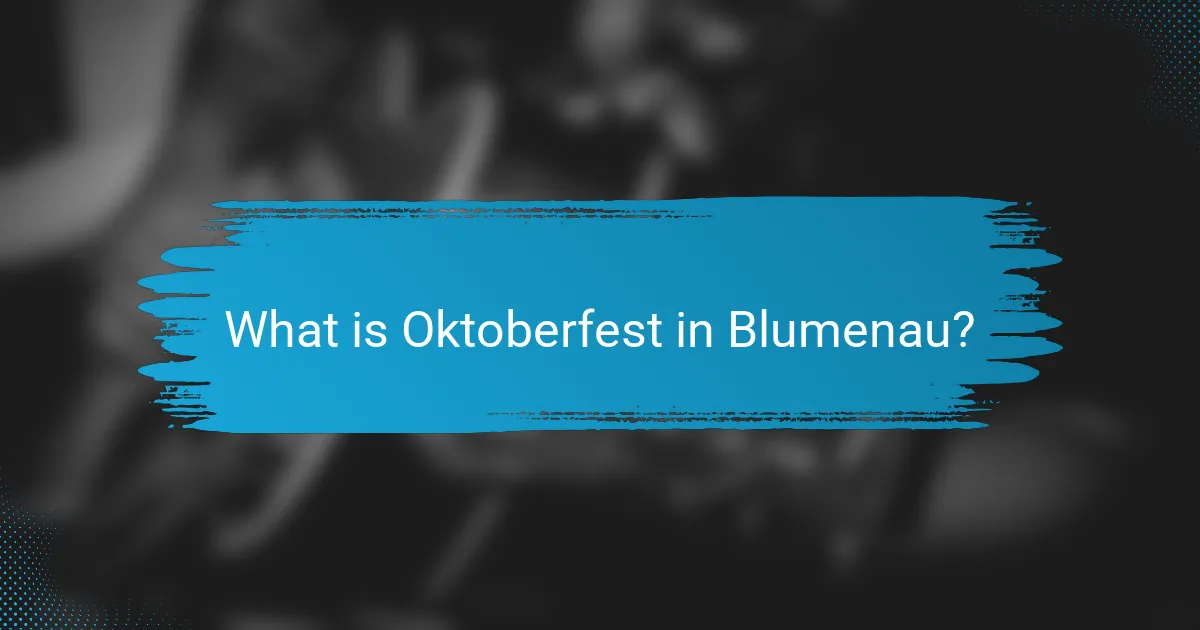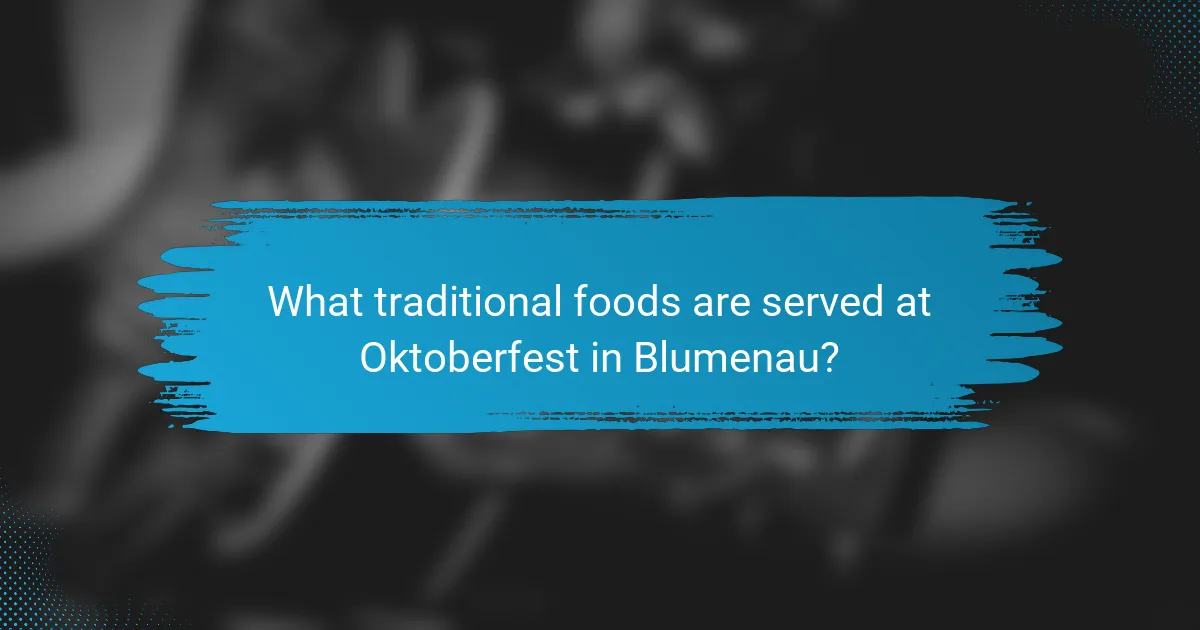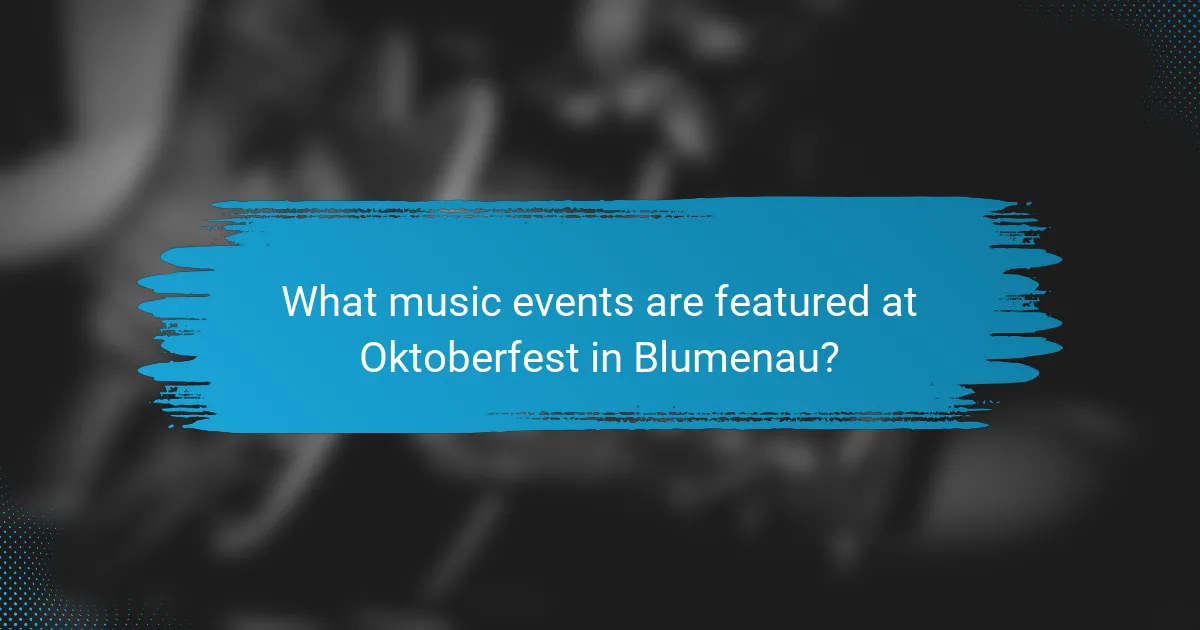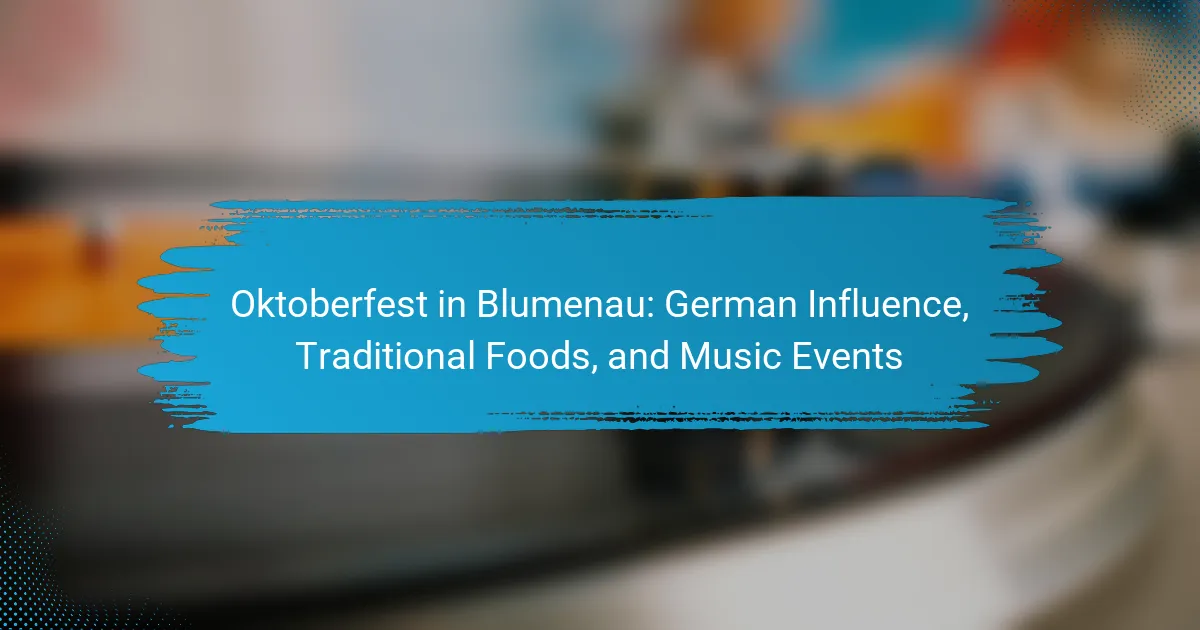Oktoberfest in Blumenau is a prominent annual festival in Brazil that celebrates German culture, making it one of the largest Oktoberfest events outside of Germany. Established in 1984, the festival features traditional German foods such as bratwurst, pretzels, schnitzels, and sauerkraut, alongside a diverse selection of German beers. The event is enriched by live performances of traditional German music, including polka and folk, creating a vibrant atmosphere for thousands of attendees each year. Additionally, the festival hosts various cultural showcases and competitions, reinforcing the significance of German heritage in Brazil.

What is Oktoberfest in Blumenau?
Oktoberfest in Blumenau is a popular annual festival celebrating German culture. It takes place in Blumenau, Brazil, and is one of the largest Oktoberfest events outside Germany. The festival features traditional German foods, such as sausages, pretzels, and schnitzels. Additionally, it showcases various types of German beer. Live music and cultural performances are integral parts of the event. The festival attracts thousands of visitors each year, promoting German heritage in Brazil. It was first held in 1984 and has since become a significant cultural event.
How did Oktoberfest in Blumenau originate?
Oktoberfest in Blumenau originated in 1984 as a celebration of German culture. It was inspired by the original Oktoberfest held in Munich, Germany. The event was established to honor the German immigrants who settled in Blumenau. The first festival attracted around 300,000 visitors. It featured traditional German food, music, and beer. Over the years, the festival has grown significantly. Today, it draws more than 500,000 attendees each year. The festival showcases Blumenau’s rich German heritage and community spirit.
What historical events led to the establishment of Oktoberfest in Blumenau?
Oktoberfest in Blumenau was established in 1984 to celebrate German heritage. The event was inspired by the original Oktoberfest in Munich, which began in 1810. Blumenau’s Oktoberfest aimed to honor the German immigrants who settled in Brazil. The city was founded by German settlers in 1850. These settlers brought their traditions and culture, including beer brewing. The festival has grown significantly since its inception. It now attracts thousands of visitors each year. The celebration features traditional foods, music, and cultural events.
How has the festival evolved over the years?
The Oktoberfest in Blumenau has evolved significantly since its inception in 1984. Initially, it began as a small local event celebrating German culture. Over the years, it has grown into one of Brazil’s largest festivals, attracting over 700,000 visitors annually. The festival has expanded its offerings to include a wider variety of traditional German foods, such as sausages and pretzels. Additionally, it now features numerous music events showcasing both local and international artists. The festival has also incorporated cultural activities, such as dance performances and craft exhibitions. This evolution reflects the increasing popularity and cultural significance of the event in Brazil. The festival’s growth has been supported by the local community and government, enhancing its infrastructure and marketing efforts.
What are the key features of Oktoberfest in Blumenau?
Oktoberfest in Blumenau features traditional German beer, extensive cultural programs, and authentic German cuisine. The festival includes live music performances, parades, and folk dances. Visitors can enjoy various local and imported beers served in large steins. The event showcases Blumenau’s German heritage through decorations and costumes. Additionally, there are craft stalls offering handmade goods. The festival typically lasts for several days, attracting thousands of attendees each year. It is one of the largest Oktoberfest celebrations outside Germany. These features contribute to a vibrant atmosphere celebrating German culture.
What cultural elements are prominent at Oktoberfest in Blumenau?
Oktoberfest in Blumenau prominently features German cultural elements. Traditional German music is a central aspect, with live bands playing folk tunes and polkas. Authentic German cuisine is showcased, including sausages, pretzels, and schnitzels. Traditional attire, such as lederhosen and dirndls, is commonly worn by attendees. The festival also highlights German beer, particularly from local breweries. Cultural performances, including dance and folklore shows, enrich the experience. Additionally, parades celebrating German heritage are a key attraction. These elements collectively create an authentic German festival atmosphere in Blumenau.
How does the festival reflect German traditions?
The festival reflects German traditions through its celebration of cultural heritage. Oktoberfest in Blumenau showcases traditional German music, such as polka and folk songs. Attendees often wear traditional attire like lederhosen and dirndls, emphasizing cultural identity. The festival features authentic German foods, including sausages, pretzels, and schnitzels. Beer plays a central role, with a focus on German brews and brewing techniques. Events like folk dances and parades highlight communal festivities rooted in German customs. The festival’s atmosphere fosters a sense of nostalgia for German immigrants and their descendants. Overall, the festival serves as a vibrant homage to the German cultural legacy in Brazil.

What traditional foods are served at Oktoberfest in Blumenau?
Traditional foods served at Oktoberfest in Blumenau include bratwurst, pretzels, and sauerkraut. Bratwurst is a German sausage made from pork, beef, or veal. It is often grilled and served with mustard. Pretzels are a type of baked bread product, typically twisted into a knot shape. They are usually salted and can be enjoyed with cheese or mustard. Sauerkraut is fermented cabbage, providing a tangy flavor that complements the meats. Other popular dishes include schnitzel, a breaded and fried meat cutlet, and strudel, a layered pastry filled with fruit or nuts. These foods reflect the festival’s German heritage and culinary traditions.
What are the popular dishes at Oktoberfest in Blumenau?
Popular dishes at Oktoberfest in Blumenau include traditional German foods. Sauerkraut, a fermented cabbage dish, is commonly served. Bratwurst, a type of German sausage, is a festival favorite. Pretzels, known for their unique shape and salty flavor, are also popular. Another dish is schnitzel, which consists of breaded and fried meat. Potato salad, often served as a side, complements the main dishes. These foods reflect the German heritage celebrated at the festival. The event attracts thousands, highlighting the cultural significance of these dishes.
How are these dishes prepared and served?
Dishes at Oktoberfest in Blumenau are typically prepared using traditional German recipes. Ingredients often include meats, potatoes, and seasonal vegetables. Cooking methods may involve grilling, roasting, or boiling. For example, sausages are grilled over open flames. Sauerkraut is often simmered to enhance its flavor. Dishes are usually served in generous portions, reflecting German culinary customs. They are often accompanied by sides such as potato salad or pretzels. Presentation is typically rustic, often using wooden plates or metal trays. This approach emphasizes the authentic experience of German cuisine at the festival.
What are the key ingredients used in traditional Oktoberfest foods?
Key ingredients used in traditional Oktoberfest foods include sausages, pretzels, and sauerkraut. Sausages, particularly bratwurst, are made from pork and seasoned with spices. Pretzels are typically made from flour, water, yeast, and salt, resulting in a chewy texture. Sauerkraut is fermented cabbage, providing a tangy flavor. Other common ingredients include roast chicken, which is seasoned and often served with potato salad. Additionally, various types of beer, especially Märzen, are integral to the Oktoberfest experience. These foods reflect Bavarian culinary traditions and are enjoyed during the festival.
Why is food an important part of the Oktoberfest experience?
Food is an important part of the Oktoberfest experience because it enhances cultural authenticity and enjoyment. Traditional German dishes, such as pretzels, sausages, and schnitzels, reflect the festival’s heritage. These foods are often paired with local beers, creating a complete culinary experience. The presence of food stalls and dining areas fosters social interaction among attendees. According to a study by the German Tourism Board, food plays a crucial role in attracting visitors to Oktoberfest events. The festival’s focus on traditional cuisine contributes to its overall atmosphere and appeal. This culinary aspect helps preserve German traditions while promoting community engagement.
How does traditional food enhance the cultural atmosphere?
Traditional food enhances the cultural atmosphere by serving as a medium for cultural expression. It reflects the history, values, and customs of a community. For instance, during Oktoberfest in Blumenau, traditional German dishes like sausages and pretzels create an authentic experience. This connection to heritage fosters a sense of belonging among attendees. Additionally, the communal sharing of food encourages social interaction. Studies show that food traditions strengthen community bonds and cultural identity. Therefore, traditional food is integral to enriching the cultural atmosphere at events like Oktoberfest.
What role does food play in community engagement during the festival?
Food serves as a central element in community engagement during the festival. It fosters social interaction among attendees. Traditional German dishes create a cultural connection, enhancing the festival’s authenticity. Shared meals encourage conversations and bonding among diverse groups. Food stalls and communal dining areas promote inclusivity and participation. Festivals like Oktoberfest often feature cooking demonstrations, which educate visitors about culinary traditions. The presence of local vendors supports community businesses, strengthening economic ties. Overall, food plays a vital role in uniting individuals and enhancing the festival experience.

What music events are featured at Oktoberfest in Blumenau?
Oktoberfest in Blumenau features a variety of music events, primarily focusing on traditional German music. The festival hosts live performances from bands playing polka, folk, and rock music. Local and international artists contribute to the vibrant atmosphere. Notable events include live concerts and dance performances. These events typically take place in large tents, enhancing the communal experience. The festival also includes competitions and showcases of musical talent. Each year, attendance at these music events draws thousands of visitors. This blend of music and culture celebrates German heritage in Brazil.
What types of music can attendees expect at Oktoberfest in Blumenau?
Attendees at Oktoberfest in Blumenau can expect a variety of music genres. Traditional German folk music is a prominent feature, creating an authentic atmosphere. Bavarian polka music is commonly played, encouraging dancing and celebration. Additionally, live bands perform contemporary music, appealing to diverse audiences. Many performances include rock and pop covers, enhancing the festive mood. The music lineup often features local artists, showcasing regional talent. Oktoberfest in Blumenau celebrates both heritage and modern influences in its musical offerings.
How do musical performances reflect the festival’s German heritage?
Musical performances at the festival reflect the German heritage through traditional folk music and dance. These performances often feature polkas, waltzes, and other styles rooted in German culture. Instruments like the accordion and brass bands are commonly used, emphasizing authentic sound. Performers typically wear traditional Bavarian attire, such as lederhosen and dirndls. This attire enhances the cultural experience for attendees. Additionally, the lyrics of many songs celebrate German history and customs. Overall, the musical elements create an immersive atmosphere that honors the festival’s origins.
What are some notable bands or artists that perform at the festival?
Notable bands and artists that perform at the Oktoberfest in Blumenau include traditional German music ensembles and local Brazilian acts. The festival features polka bands, folk music groups, and various genres to celebrate German culture. Artists often perform in traditional attire, enhancing the cultural experience. The event attracts both national and international performers, contributing to its vibrant atmosphere. Specific bands may vary each year, showcasing a mix of established and emerging talent. This diversity in music enriches the festival’s appeal and keeps the audience engaged.
How does music contribute to the overall Oktoberfest experience?
Music enhances the overall Oktoberfest experience by creating a festive atmosphere. It encourages social interaction among attendees. Traditional German music, including polkas and folk tunes, is commonly played. This music connects visitors to German culture and heritage. Live bands perform regularly, drawing crowds and keeping energy levels high. The rhythmic beats often prompt dancing and celebration. Music also serves as a backdrop for traditional activities and food consumption. Overall, it plays a crucial role in making Oktoberfest enjoyable and memorable.
In what ways does music foster community and celebration at the festival?
Music fosters community and celebration at the festival by creating shared experiences among attendees. It brings people together through collective participation in singing and dancing. Live performances encourage interaction and bonding among festival-goers. Traditional music reflects cultural heritage, enhancing the sense of belonging. Specific genres, such as polka and folk, resonate with the festival’s theme, attracting diverse audiences. The rhythmic nature of music promotes joy and enthusiasm, leading to a festive atmosphere. Additionally, music acts as a backdrop for socializing, facilitating conversations and connections. Overall, music plays a vital role in uniting individuals and enhancing the celebratory spirit of the festival.
What tips can attendees follow to make the most of their Oktoberfest experience?
Attendees can enhance their Oktoberfest experience by planning ahead. Arriving early allows for better seating and fewer crowds. Sampling various traditional foods like pretzels and sausages enriches the culinary experience. Participating in cultural activities, such as folk dances, adds to the festive atmosphere. Staying hydrated is crucial, especially when consuming beer. Understanding the event schedule helps in catching live music performances. Dressing in traditional attire like lederhosen or dirndls enhances the experience. Lastly, mingling with locals can provide unique insights into the festival’s traditions.
Oktoberfest in Blumenau is a significant annual festival in Brazil celebrating German culture, featuring traditional foods, music, and cultural performances. Established in 1984, it honors the German immigrants who settled in Blumenau and has grown to attract over 700,000 visitors each year. The festival showcases a variety of authentic German dishes, such as bratwurst and pretzels, alongside live music events that highlight both traditional and contemporary genres. Key cultural elements, including folk dances and parades, further enhance the vibrant atmosphere, making it a prominent celebration of German heritage in Brazil.
